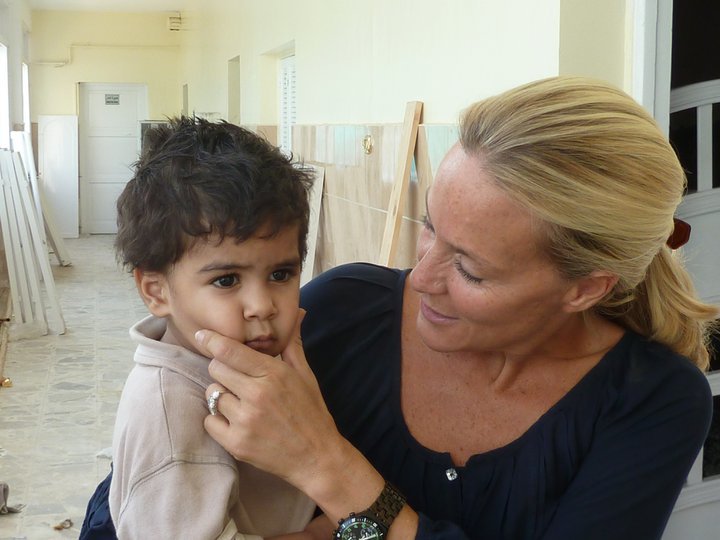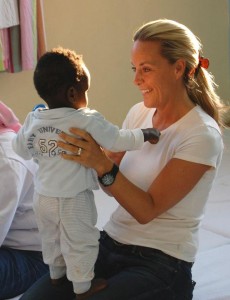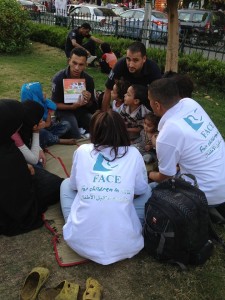#ScoopHero2015: The Woman Who Made It Her Mission to Save Street Children in Egypt

Street children have been a massive social issue in Egypt for countless years. With the underground mafias who control them seemingly growing and gaining strength, we tend to see more and more kids on the streets begging for money.
It’s always been a dilemma of whether or not to give these kids cash or spare change, knowing that the money doesn’t really go to them at the end and that it also helps keep them on the street. But when you don’t, these kids get beaten, tortured and punished by the heads of their gangs because they didn’t deliver the quota they were supposed to earn on the streets.
While we can sit here all day and debate the concept, it still wouldn’t be helping these kids. Don’t they deserve an education? Don’t they need medical assistance? Don’t they deserve to just be kids?
One hero made it her mission to take action and do something about it instead of just sitting around. Flavia Shaw-Jackson, born in South Africa to French parents and raised in Belguim, has always been deeply affected by the suffering that children experience in many parts of the world. After watching a BBC documentary broadcast called The Dying Rooms about orphanages in China in 2003, Shaw-Jackson founded the non-profit organization FACE for Street Children in Cairo.
“In 2001, I happened to go to Cairo: I still remember a young mother carrying her child on her shoulders,” Shaw-Jackson said. “The child was in a shocking state. In his eyes, I could see the characteristic expression of children that detach themselves from life in order to protect themselves from their suffering and despair.”
 Shaw-Jackson came back to Cairo in 2003 and visited many orphanages. She saw plenty of children who had their basic needs met, but were lacking in love and affection. She also visited children in slum areas who had very little — no rooftops to shelter them, minimal clothing and food, yet they had parental love and care, which she is sure is the reason behind the sparkle in their eyes.
Shaw-Jackson came back to Cairo in 2003 and visited many orphanages. She saw plenty of children who had their basic needs met, but were lacking in love and affection. She also visited children in slum areas who had very little — no rooftops to shelter them, minimal clothing and food, yet they had parental love and care, which she is sure is the reason behind the sparkle in their eyes.
Wanting to help, she contacted and met local authorities, Ministries, the Egyptian embassy in Belgium, the National Council for Childhood and Motherhood in Cairo, as well as experts in the field of young children. With each visit, Shaw-Jackson created an in-depth file for each establishment showing different ways they could benefit from aid in Cairo, along with a financial plan. By November of that year, Shaw-Jackson created a non-profit organization in Belgium and went about the procedures to register as an NGO in Egypt.
She started off by renovating two existing orphanages in Cairo, one in Zeiton and the other in Kalioubeya.
“Total dilapidation. The newborns that had been found in the streets were plunged, crying, into buckets of cold water. Disposable nappies were wiped and dried in the sun so that they could be reused. The babies never left their beds and never saw the light of day. Some, through total boredom and despair, hit their heads continuously on their mattress, whilst others sat immobile, against the damp walls looking completely detached,” Shaw-Jackson recalls.
“I took one baby in my arms and asked why he had so many wounds and scars on his face and body. I was told that he had been abandoned in the street as soon as he was born and had been mauled by dogs and cats. It was a terrible shock and I decided that I would never give up,” she said.
This made her realize that children need love to survive. Her goal was to get as many children to feel the love they deserved to survive as well as reintegrate them into society. This is why she created FACE in 2003. The aim of FACE is to help orphans and street children and to reintegrate them into families and society with love and affection.
“The number of street children in Egypt varies between 50, 000-1,000,000 street children depending on the sources,” Shaw-Jackson says. “Once they’re on the streets they face police arrests, sexual abuse and rejection from society.”
So how does this non-profit organization manage to re-integrate these kids into families, schools, jobs and society?
 At the World Innovation Summit for Education (WISE) this year, Shaw-Jackson explains that there are FACE teams whose mission is to build trust with the children on the streets of Cairo by interacting with them and giving them the freedom to be themselves without using any intrusive methods until the children feel comfortable enough to open up to the team members. That’s when the children are informed about the drop-in centres, but are left to take the decision to go there on their own.
At the World Innovation Summit for Education (WISE) this year, Shaw-Jackson explains that there are FACE teams whose mission is to build trust with the children on the streets of Cairo by interacting with them and giving them the freedom to be themselves without using any intrusive methods until the children feel comfortable enough to open up to the team members. That’s when the children are informed about the drop-in centres, but are left to take the decision to go there on their own.
Once they decide to go to the drop in-center, the children receive medical care, psychological support, fun and games through non-formal education as well as food, a place to shower and feel safe. This is also where they learn to accept rules and the basics in literacy, math, history and science through non-formal education classes.
The drop in-centers also teach them to protect themselves on the streets and educate them on health, hygiene, reproductive hygiene, organ trafficking, drugs as well as child rights.
As FACE’s main aim is to re-integrate the children into society, a case manager is chosen for each child and the file is closed only once the child is re-integrated successfully. The case manager makes sure the child gets psychological support or counseling, sets goals that the child needs to accomplish and works with the families to find out why the child ended up on the street and what can be done to solve it. In other words, the child is given love as well as education, because FACE believes one is not possible without the other.

FACE has already reintegrated around 407 children. Although that might seem like a small number, Shaw-Jackson explains that a child is only considered a successful reintegration after a year and a half. With the help of FACE, 35,000 services are provided to street children, 2,600 children receive medical support each year and 3,200 remedial classes are given.
It took one incredible woman’s extreme efforts to reach a stepping stone in tackling the the underlying problems of street children. With the strategy that FACE is applying, we see hope for the integration of many street children in the future. That’s why we believe that Flavia Shaw-Jackson is an unsung hero of 2015 — someone who deserves recognition, appreciation and more people to follow in her footsteps in the hope of turning this country around for the better. Flavia Shaw-Jackson, we need more heroes like you in Egypt.
WE SAID THIS: Don’t miss Violence Against Street Children in Egypt
